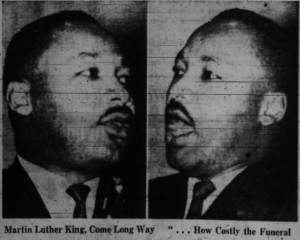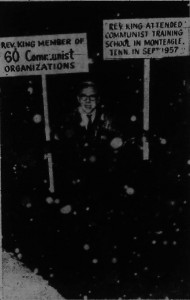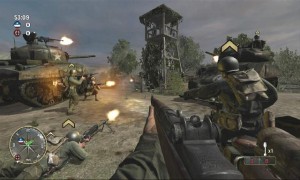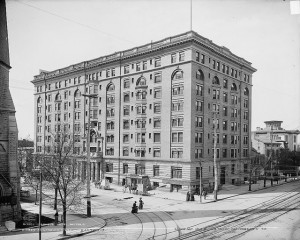
The Algonquin in 1904
What do you do if you’re stuck in Dayton’s past, bad guys are after you, and you need a place to hunker down until you can return to the twenty-first century? If you’re time-traveler Tony Solomon, you approach the problem logically, and go to the first hotel you think of that was there then – and is still there in the twenty-first century, and is still a hotel.
The obvious choice would be the Gibbons, now the Dayton Grand Hotel.
Initially named the Algonquin, the building was constructed in 1898, and helped establish Dayton as a place to do business, whether you’re visiting from across Ohio, or across the Atlantic Ocean. According to one newspaper, “People can no longer point to Dayton as a one-street city.”
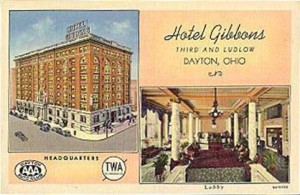
The Gibbons Hotel, from a 1930s postcard
The Algonquin made the news during the Great Flood of 1913, where some 250 people were trapped in the upper floors. They were better off than most people stranded by the 12-15 foot waters, for they had food and a relatively comfortable place to sleep.
Real estate developer Michael J. Gibbons bought the Algonquin in 1918, and changed its name to the Gibbons Hotel, which it remained until 1963, when it became the Dayton Inn. Either then or later, it became part of the Hilton properties, going through several names. It was the Doubletree from the late 90s until just a couple months ago. It’s now called the Dayton Grand Hotel.
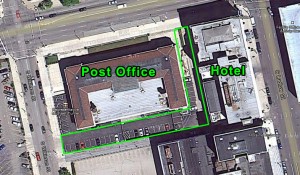

Above is the hotel as it is today. The building next to it was the Post Office in the 1930’s. That building currently houses the Federal Bankruptcy Court. The parking lot, outlined in green, is accessible from Third Street by a narrow alley between the buildings, and plays a key role in Time’s Enemy.
Photos: Algonquin Hotel in 1904 via Dayton History Books Online, courtesy of the Library of Congress
1930s Postcard of the Gibbons Hotel via Etsy.com
Modern-day photos via Google Maps and Google Street View
For reference: Dayton History Books Online
Here’s a short excerpt from Time’s Enemy, in which Tony discovers that perhaps the Gibson wasn’t such a good place to hide after all.
Tony paced across his room at the Gibbons, the only downtown hotel he was aware of that still existed as such in his time, although it had a different name. He threw open the window and gazed over the parking lot, already darkened by the lengthening shadows of the buildings that surrounded it on three sides.
He’d blundered around for hours after he left Charlotte, then took in a movie, something about a lion tamer. He sat through it twice—not because it was good, but because it had enough action to take the edge of his mind off Charlotte.
He paced to the door, then back to the window again. What was he thinking? He was a man who led through knowledge and order. A man who rearranged the magazines on people’s coffee tables. Not the kind of guy who threw a punch without thinking. Or at all, for that matter.
Never mind that it had felt damn good.
Through Charlotte, he’d discovered his heart wasn’t dead, and he could still feel excitement, anticipation and wonder. She was the first woman he’d found remotely interesting since Dora’s defection.
The woman who had the answer he needed but wouldn’t give it to him. Hopelessness settled over him like a new fallen snow. In his quest for knowledge, he’d failed. Was the one thing he wanted—his daughter’s life—too much to ask?
He sat and took off his shoes. If he got extra sleep, maybe the mental energy he needed to bring on the pull would build sooner.
He peered around the room. Bed, dresser, nightstand. Not much different than any of those he’d stayed in on his many travels, other than the absence of a TV and phone. And quiet. At his request, the desk clerk had given him a luxury room with a private bath on the sixth floor. There were no other guests in the wing.
It would be an adequate place to live—exist—until the pull returned him to the twenty-first century. Hopefully, the room would be unoccupied in his time. After he warped, he’d check into the modern-day hotel, then crash.
He wandered back toward the door when someone knocked.
“Yes?” What the hell did someone want this late?
“Room service,” a man in the hallway called.
“I didn’t order anything.” Tony hoped the intruder heard the irritation in his response.
“It says Room 639 right here on the order… Open faced beef sandwich with mashed potatoes, green beans, apple pie…”
Hmmm, that sounded good. Tony hadn’t eaten since breakfast, hadn’t been hungry, but eating might also speed the renewal of his mental energy. Better take them up on it, even if he didn’t order the dinner. He yanked the door open.
The black man in the hallway wore a white server’s uniform, but his hands were empty. Tony glanced down the hall in both directions. Where was the cart? “Where’s the food?”
“My apologies, Mr. Solomon, but I need to talk to you—”
Tony glowered at the man. “Who are you and what do you want?” Something about him struck Tony as familiar.
“My name is Theodore Pippin.”
Fear shot an icy tentacle down Tony’s throat. He couldn’t move. Moisture trickled down his back beneath his undershirt. God, how could he be so stupid? Charlotte and his failure had clouded his mind so much he’d forgotten all about the Saturn Society’s threat.
His stupor snapped. He shoved the door, but he man blocked it with his foot. “I’m with an organization called the Saturn Society… perhaps you’ve heard of us?”
“Yeah, and I’m not interested.” Tony leaned against the door, trying to dislodge Pippin’s foot. “Get out—”
“I’m afraid it’s not that simple, Mr. Solomon. Now if I could come in, we could discuss this like gentlemen…”
“There’s nothing to discuss.” Not with the man who’d been lauded for subduing more time-criminals than any other Society member in known history. Tony leaned harder against the door, but Pippin’s foot held. “Get out of here, or I’ll—” Somewhere outside, a woman shouted. He glanced at the window. Big mistake. Pippin took the opportunity to wedge himself through the door.
More information on Time’s Enemy

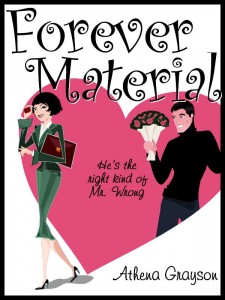 So where are all the romance novels that take place in Ohio? It’s the first place that comes to mind when choosing a setting… oh wait, that’s just me. Or is it?
So where are all the romance novels that take place in Ohio? It’s the first place that comes to mind when choosing a setting… oh wait, that’s just me. Or is it? But what about historical romance, or paranormal? Those are a little trickier. The only historical that quickly comes to mind is Into the Valley, by Roseanne Bittner, which is several years old, but very good. For paranormal, there’s Kim Harrison’s Dead Witch Waling urban fantasy series. I haven’t read these, so I don’t know how much romance is in them, if any.
But what about historical romance, or paranormal? Those are a little trickier. The only historical that quickly comes to mind is Into the Valley, by Roseanne Bittner, which is several years old, but very good. For paranormal, there’s Kim Harrison’s Dead Witch Waling urban fantasy series. I haven’t read these, so I don’t know how much romance is in them, if any.



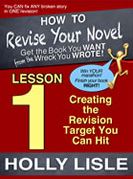 Holly also had a long-term, online workshop that sounded cool, but her second one of these – How to Revise Your Novel – that caught my eye. It’s subtitled “How to Get the Book You Want from the Book You Have.” I signed up as a charter member.
Holly also had a long-term, online workshop that sounded cool, but her second one of these – How to Revise Your Novel – that caught my eye. It’s subtitled “How to Get the Book You Want from the Book You Have.” I signed up as a charter member.
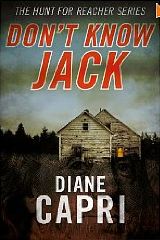 Once again, I’m doing some reading outside of my normal fare. This time it’s Don’t Know Jack, by Diane Capri. I’m not sure how to categorize this – mystery? Thriller? Suspense? It’s all three! One thing it’s not is romance. Normally, I like at least a little romance in my books, and there’s none here – and it totally works!
Once again, I’m doing some reading outside of my normal fare. This time it’s Don’t Know Jack, by Diane Capri. I’m not sure how to categorize this – mystery? Thriller? Suspense? It’s all three! One thing it’s not is romance. Normally, I like at least a little romance in my books, and there’s none here – and it totally works!






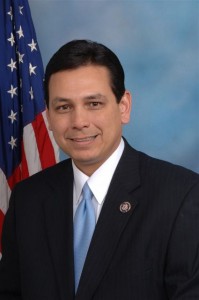


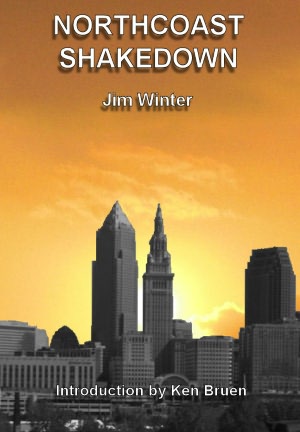 I first read Northcoast Shakedown by my friend
I first read Northcoast Shakedown by my friend 
